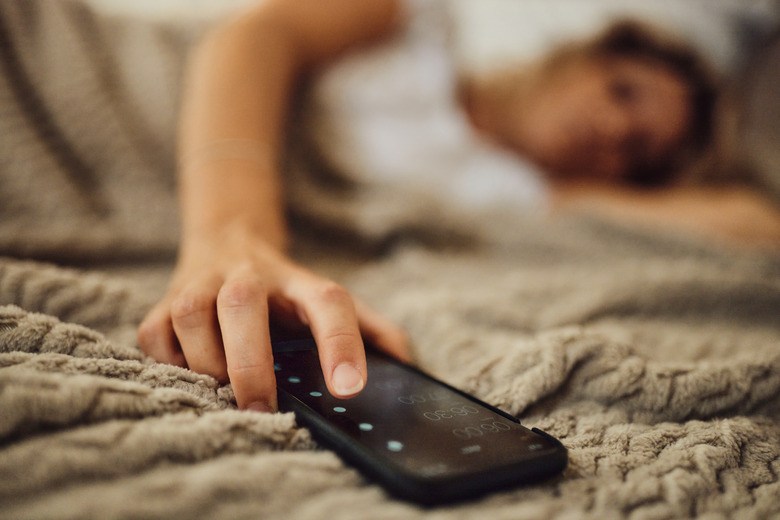Is It Actually Bad To Press Snooze On Your Alarm Clock?
Many of us know what it's like to be woken up by an alarm clock, only to fumble around and hit snooze ... again ... and again ... and again. This might even be something you do on most days, especially if you're not a morning person. But is it bad to snooze your alarm? And if so, how do you stop doing it? To answer these questions and more, we interviewed sleep experts and medical professionals for their expert opinions.
Is It Bad to Snooze Your Alarm?
Is It Bad to Snooze Your Alarm?
Although hitting snooze can feel like a lifesaver on early mornings, it can actually do more harm than good. Specifically, it could lead to fragmented sleep, resulting in daytime tiredness.
"During sleep, the body undergoes stages of sleep involving REM and non-REM sleep," Susan Miller, certified sleep technician at Sleep Mattress HQ, tells Hunker. In order to feel rested, you need to cycle through these stages several times, according to Cleveland Clinic. However, if this cycle is interrupted — by, say, repeatedly pressing the snooze button — you won't be able to get quality rest. In turn, Miller explains that you'll feel fatigued and groggy.
What's more, the habit "can disrupt your body's natural sleep-wake cycle, [making] it more difficult for you to fall asleep at night," according to Miller. Come morning, you'll still feel tired, increasing the temptation to hit snooze (again). Over time, "this can lead to poor sleep and fatigue, which can negatively affect your physical and mental well-being," says Miller.
What If You Press Snooze Once or Twice?
What If You Press Snooze Once or Twice?
Okay, so repeatedly hitting snooze isn't good for catching quality Zs. But is it really that bad if you do it every now and then?
According to Garry Spink, Ph.D. psychologist and founder of Spink Psychology, it depends on your current sleep habits. If you've been trying to adjust your sleep schedule, it's best to avoid hitting snooze at all, he says. "The main reason is that change requires consistency over time, [and] hitting snooze once can cause you to fall back into old habits," Dr. Spink tells Hunker. Otherwise, if you have no current sleep difficulties, occasionally hitting snooze once or twice is unlikely to cause any issues, he says.
How to Stop Snoozing Your Alarm Clock
How to Stop Snoozing Your Alarm Clock
If you want to break the habit of snoozing your alarm, you'll be glad to know that it's possible to do just that. The trick is to practice certain habits that make it easier to get out of bed. With that in mind, here's how to stop snoozing your alarm clock, according to the experts.
Sit Up When Your Alarm Goes Off
One technique is to sit up (and get out of bed, if you can) when your alarm goes off. That's because "it requires you to move and change positions, making it harder to fall back asleep," says Miller. Otherwise, if you continue lying in bed in a relaxed position, it will be too easy to fall back asleep. "Sitting up and getting out of bed, however, can help stimulate your body and mind, making it easier to stay awake," Miller states.
Place Your Alarm Clock Far Away
If your alarm clock is within reach from your bed, you might want to rearrange your space. "Consider placing your alarm clock on the other side of the room or in a place [far away from the bed]," suggests Miller. Not only will this force you to get up, but it may minimize the temptation to repeatedly hit the snooze button.
Focus on Your Sleep Schedule
Perhaps the best way to break the snooze habit is to get good sleep to begin with. "The need to snooze often occurs when a person doesn't get enough sleep [or] feel rested," Po-Chang Hsu, M.D., medical content expert at Sleeping Ocean, tells Hunker. In this case, it's important to adjust your bedtime to allow for adequate sleep, which is seven to eight hours for most folks, he adds. It's also worth sticking to a consistent sleep schedule — i.e., getting up and going to bed at the same time every day. This will make it easier to fall asleep at night, thereby increasing your chances of getting enough rest and reducing the need to snooze the alarm come morning, says Dr. Hsu.
While you're at it, try to practice good sleep hygiene. According to Miller, this includes techniques such as adopting the best room temperature for sleep, experimenting with your bedroom lighting or trying out some blackout curtains, using earplugs or a sound machine to block noise pollution, avoiding electronics that could ruin your sleep before bed, creating a relaxing bedtime ritual, and skipping caffeine at least five to six hours before hitting the hay.
Bottom line: Hitting snooze might be gratifying in the moment, but it won't help you feel more rested, says Dr. Hsu. Instead, it will likely make you feel exhausted throughout the day.
If you're still having a hard time getting up after fine-tuning your sleep habits, consider visiting a sleep physician. They can determine if you have a medical sleep condition or if other lifestyle factors are at play.
